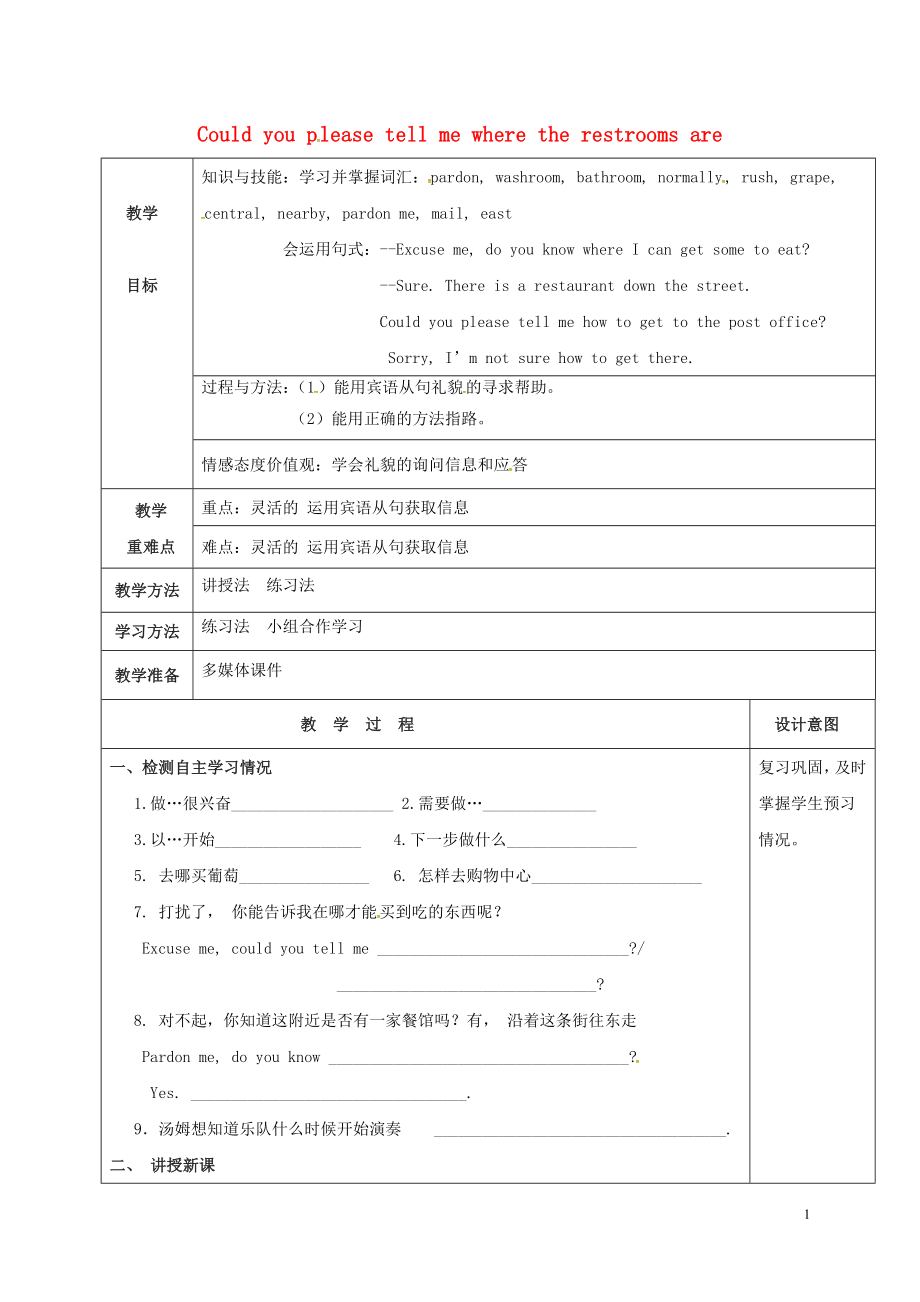《陜西省延安市富縣羊泉鎮(zhèn)九年級英語全冊 Unit 3 Could you please tell me where the restrooms are(第3課時(shí))教案 (新版)人教新目標(biāo)版》由會(huì)員分享���,可在線閱讀,更多相關(guān)《陜西省延安市富縣羊泉鎮(zhèn)九年級英語全冊 Unit 3 Could you please tell me where the restrooms are(第3課時(shí))教案 (新版)人教新目標(biāo)版(3頁珍藏版)》請?jiān)谘b配圖網(wǎng)上搜索���。
1、Could you please tell me where the restrooms are
教學(xué)
目標(biāo)
知識與技能:學(xué)習(xí)并掌握詞匯:pardon, washroom, bathroom, normally, rush, grape, central, nearby, pardon me, mail, east
會(huì)運(yùn)用句式:--Excuse me, do you know where I can get some to eat?
--Sure. There is a restaurant down the street.
2���、 Could you please tell me how to get to the post office?
Sorry, I’m not sure how to get there.
過程與方法:(1)能用賓語從句禮貌的尋求幫助���。
(2)能用正確的方法指路���。
情感態(tài)度價(jià)值觀:學(xué)會(huì)禮貌的詢問信息和應(yīng)答
教學(xué)
重難點(diǎn)
重點(diǎn):靈活的 運(yùn)用賓語從句獲取信息
難點(diǎn):靈活的 運(yùn)用賓語從句獲取信息
教學(xué)方法
講授法 練習(xí)法
學(xué)習(xí)方法
練習(xí)法 小組合作學(xué)習(xí)
教學(xué)準(zhǔn)備
多媒體
3���、課件
教 學(xué) 過 程
設(shè)計(jì)意圖
一、檢測自主學(xué)習(xí)情況
1.做…很興奮____________________ 2.需要做…______________
3.以…開始__________________ 4.下一步做什么________________
5. 去哪買葡萄________________ 6. 怎樣去購物中心_____________________
7. 打擾了, 你能告訴我在哪才能買到吃的東西呢���?
Excuse me, could you tell me _______________________________?/
4���、 ________________________________?
8. 對不起���,你知道這附近是否有一家餐館嗎���?有, 沿著這條街往東走
Pardon me, do you know _____________________________________?
Yes. __________________________________.
9.湯姆想知道樂隊(duì)什么時(shí)候開始演奏 ____________________________________.
二���、 講授新課
1. Read the conversation i
5、n 2d and answer the questions first.
(1 )How does Alice feel when she is in the Fun Times Park?
(2 )What does Alice want to do?
2. Follow the tape and pay attention to the pronunciation and word groups.
3. Explain the language pints in 2d.(根據(jù)每組四號寫出的重難點(diǎn)進(jìn)行講解)
4. Practice the conversations in the
6���、ir groups ,then ask several students to act it out.
then check answers together.
三���、合作交流,問題研討
1.小組內(nèi)討論交流4a-4c答案���,然后全班展示���,注意不同的表達(dá)方法。
2.小組討論賓語從句���,并作以小結(jié):
a. 連接詞(that, if/whether, what/who/when/where/how…)
b. 語序:賓語從句的語序用陳述語序
c. 時(shí)態(tài):如果主句是一般現(xiàn)在時(shí),則從句根據(jù)需要選用時(shí)態(tài)���;如果主句是過去式,則從句用相應(yīng)的過去時(shí)態(tài)���。如
He says that he
7���、 is doing his homework.
He said that he was doing his homework.
I want to know if it will rain tomorrow.
I wanted to know if it would rain tomorrow.
Could you tell me where Tom lives?
My mother asked me what I wanted to eat for dinner.
四���、課堂小結(jié)
Summary: what we have learnt in this class.(
8���、每組一號)
復(fù)習(xí)鞏固���,及時(shí)掌握學(xué)生預(yù)習(xí)情況���。
問題設(shè)置側(cè)重學(xué)生對對話的整體理解
學(xué)會(huì)傾聽別人的亮點(diǎn),發(fā)現(xiàn)問題���。
對本節(jié)課進(jìn)行總結(jié)
板書
設(shè)計(jì)
Unit 3 Could you please tell me where the restrooms are?
Section A 2d, grammar focus 4a-4c
a. 連接詞(that, if/whether, what/who/when/where/how…)
b. 語序:賓語從句的語序用陳述語序
c. 時(shí)態(tài):如果主句
9���、是一般現(xiàn)在時(shí),則從句根據(jù)需要選用時(shí)態(tài)���;如果主句是過去式���,則從句用相應(yīng)的過去時(shí)態(tài)���。如
He says that he is doing his homework.
He said that he was doing his homework.
I want to know if it will rain tomorrow.
I wanted to know if it would rain tomorrow.
Could you tell me where Tom lives?
My mother asked me what I wanted to eat for dinner.
教后
反思
3
 陜西省延安市富縣羊泉鎮(zhèn)九年級英語全冊 Unit 3 Could you please tell me where the restrooms are(第3課時(shí))教案 (新版)人教新目標(biāo)版
陜西省延安市富縣羊泉鎮(zhèn)九年級英語全冊 Unit 3 Could you please tell me where the restrooms are(第3課時(shí))教案 (新版)人教新目標(biāo)版

